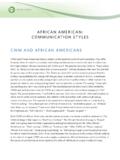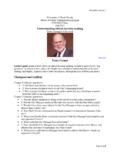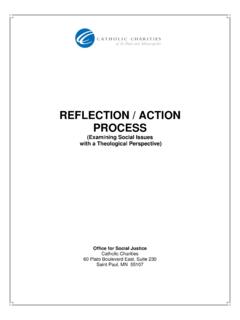Transcription of Honesty, Integrity and Ethics in Public Relations
1 honesty , Integrity and Ethics in Public Relations Success in Public Relations demands strict intellectual honesty and Integrity in all aspects of one's professional demeanor. Introduction In the quote above, Mitchell Friedman ( ), identifies a core principle of Public Relations . Professionals in the field of Public Relations are in constant contact with various sectors of the business and Public communities. honesty and Integrity must be practiced at all times in Public Relations in order to maintain credibility. However, determining if an action is ethical or not goes beyond one's perception of right or wrong. Wilcox, Cameron, Ault, & Agee (2003) state: Public Relations professionals have the added dilemma of making decisions that satisfy (1) the Public interest, (2) the employer, (3) the professional organization's code of Ethics , and (4) their personal values.
2 In the ideal world, the four would not conflict. In reality, however, they often do (p. 59). Ethics Defined According to Lucas (2001), Ethics is the branch of philosophy that deals with issues of right and wrong in human affairs (p. 34). Wilcox et al. (2003, p. 59) adds, It is expressed through moral behavior in specific situations. An individual's conduct is measured not only against his or her conscience but also against some norm of acceptability that has been societally, professionally, or organizationally determined.. Even though Ethics can be defined, there is always controversy surrounding ethical behavior. What constitutes some norm of acceptability? Ultimately it is the individual 1. who acts upon his or her value system to make decisions about what is right or wrong. However, his or her actions may or may not be perceived by someone else as ethical behavior.
3 Unethical Practices I don't want any yes-men around me. I want everybody to tell me the truth even if it costs them their jobs (Goldwyn, , p. 1). This quote by Samuel Goldwyn summarizes the expected behavior of Public Relations practitioners. However, the Ethics in Public Relations really begins with the individual and is directly related to his or her own value system as well as to the good of society (Wilcox et al., 2003, p. 76). Examples of how individuals have been known to compromise their Ethics include lying for an employer, accepting gifts and/or bribes, writing misleading press releases, withholding information, and covering up potentially harmful situations ( ). Practices such as those cited above have earned unscrupulous practitioners the labels of flacks or spin doctors. The term flack has been used to describe press agents who saturate various forms of media with news releases which counteracts journalists'.
4 Attempts to report to the Public . There are two opposing views whether or not the term spin doctors has a negative connotation. In one camp are those who condemn spin doctors as purveyors of deception, manipulation, and misinformation (Wilcox et al., 2003, p. 12). Others feel the term spin doctors accurately describes what Public Relations practitioners do. Pat Jackson, the publisher of PR Reporter, believes, 'We're all spinners because it simply means marshaling the data from your viewpoint, attempting to persuade others your viewpoint is legitimate' (Cited in Wilcox et al., p. 12). 2. Fitzpatrick and Gauthier (2001, p. 2) suggest that the field of Public Relations has done a poor Public Relations job on the profession. Because the field has not adequately defined the roles and expectations of Public Relations practitioners, the business and Public sectors do not understand nor appreciate their function in society.
5 As a result, there is some confusion regarding what practitioners do. Is their main function to persuade? Are they journalists? Are they involved in marketing or advertising? This misunderstanding of roles can lead some to consider that certain behaviors are unethical. The Importance of Ethics in Public Relations Common sense would dictate that anyone working as a Public Relations practitioner would wish to establish a reputation for being honest and trustworthy. Nothing would create suspicion and doubt with clients and/or their constituents more than fraudulent, deceptive, and dishonest practices. Leeper (1996, p. 2) states, Ethics must be central to Public Relations . She goes on to explain that the field of Public Relations functions as the conscience of management. The role of Public Relations practitioners is to advise their clients of the effects the clients' decisions and to help them determine if their actions not only support the organization but are also in the best interest of everyone their decisions affect (Leeper, 1996, p.)
6 2). Fitzpatrick & Gauthier (2001) agree that the practitioner's first allegiance is to his or her client who trusts the practitioner to represent the client's interests. However, where does social conscience fit in the scheme? Fitzpatrick and Gauthier (2001, p. 8) suggest that the practitioner has a responsibility to advise his/her client of the social implications of the client's decisions. At times the practitioner may have to walk a fine line pleasing the client, the client's constituents, the 3. practitioner's agency, and at the same time, keeping in touch with his/her value system. Bivens (1993), as cited in Fitzpatrick & Gauthier (2001, p. 8), offers, First, if every individual practicing Public Relations acts in the best interest of his or her client, then the Public interest will be served. Second, if in addition to serving individual interests, an individual practicing Public Relations serves Public interest causes, the Public interest will be served.
7 Public Relations Code of Ethics Most professions have developed a code of professional conduct to establish behavioral guidelines for their employees and the field of Public Relations is no exception. The Public Relations Society of America (PRSA), created the Code of Professional Standards for the Practice of Public Relations which was updated in 2000 to the Member Code of Ethics . The introductory statement preceding the core principles very clearly communicates the rationale for such a code. This statement presents the core values of PRSA members and, more broadly, of the Public Relations profession. These values provide the foundation for the Member Code of Ethics and set the industry standard for the professional practice of Public Relations . These values are the fundamental beliefs that guide our behaviors and decision-making process. We believe our professional values are vital to the Integrity of the profession as a whole (Wilcox et al.)
8 , 2003, p. 60). The professional values identified and described in the code include advocacy, honesty , expertise, independence, loyalty, and fairness. In addition, the code targets inappropriate conduct and gives examples (Wilcox et al., 2003, p. 60). While the code is 4. no longer enforced, the PRSA reserves the right to prohibit membership to potential members or to eject members from the organization if they have been sanctioned by a government agency or convicted in a court of law of an action that is in violation of the code (Wilcox et al., p. 59). Conclusion The message communicated in the Public Relations principle, [s]uccess in Public Relations demands strict intellectual honesty and Integrity in all aspects of one's professional demeanor, appears to be simple enough. In reality, however, it is very complex. Ethics in the field of Public Relations goes beyond knowing right from wrong on a personal level.
9 A Public Relations practitioner must not only come to terms with his or her own value system, but must know how to deal with value systems that are incongruent with his or her own. The Public Relations practitioner serves many masters. He or she should be loyal to his or her clients, but at the same time have enough of conscience to persuade clients to make decisions for the good of society. This does not always happen. Practitioners, as with professionals in other fields, are sometimes tempted by money, power, and greed. A true Public Relations professional, however, will take the PRSA Member Code of Ethics seriously, make a conscious and deliberate effort to live by it, and make sure that others do, too. Discussion Questions 5. 1. Do you feel a Public Relations practitioner can engage in ethical decisions 100% of the time? Use an explanation or example to support your answer.
10 2. How would you handle this situation? Your boss offers you his condo at Lake Tahoe for a week if you will falsify a press release and send it to the media. 6. References Fitzpatrick, K., & Gauthier, C. (2001). Toward a professional responsibility theory of Public Relations Ethics . Journal of Mass Media Ethics , 16(2). Retrieved June 10, 2003, from +0+1n+en- us+sid+ Friedman, M. (2001). Friedman's principles of Public Relations . The CEO Refresher. Retrieved June 9, 2003, from ! Leeper, (1996). Public Relations Ethics and communitarianism: A preliminary investigation. Public Relations Review, 22(2). Retrieved June 9, 2003, from 1= Lucas, S. E. (2001). The art of Public speaking (7th ed.). Boston: McGraw-Hill. Truth quotes, truth quotations, truth sayings-famous quotes and sayings. ( ). Retrieved from June 9, 2003, from ~ Wilcox, D. L., Cameron, G. T., Ault, P.





